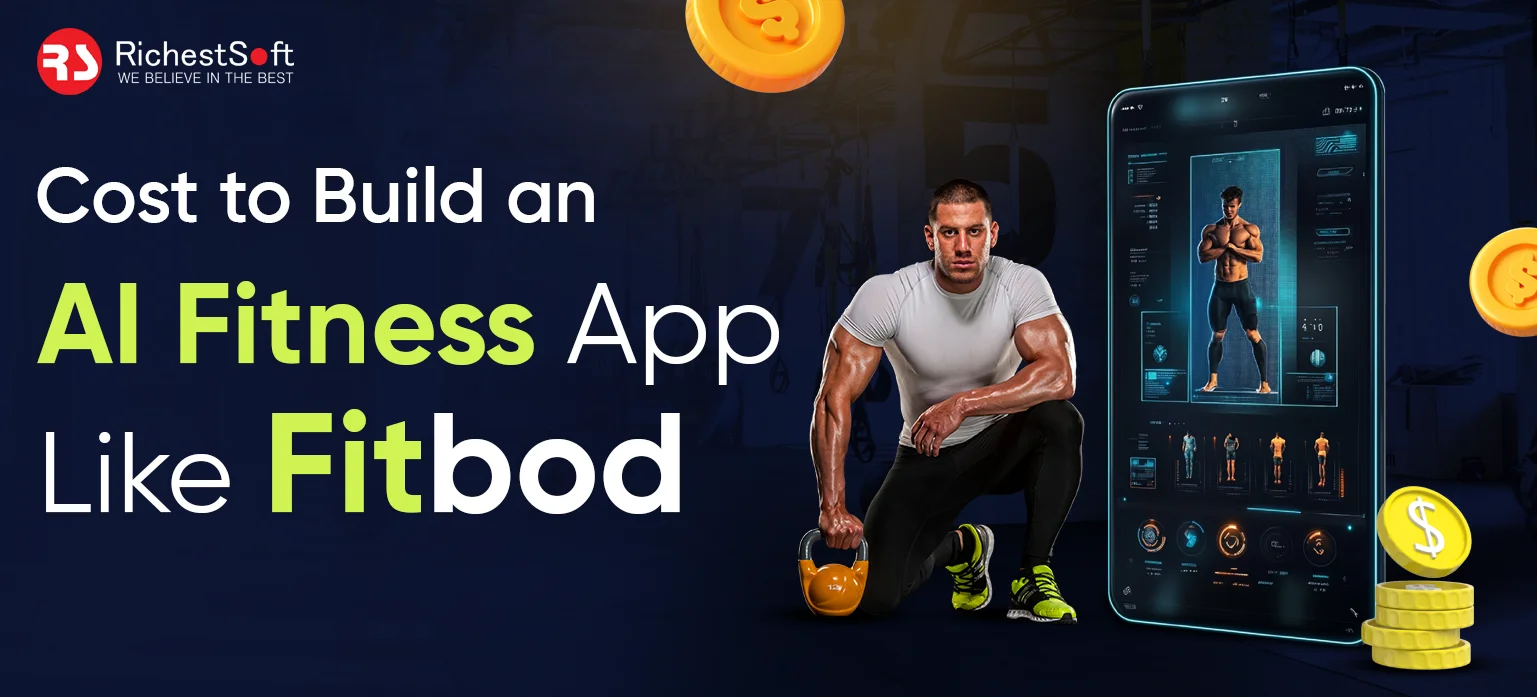June 30, 2025
The fitness industry is experiencing rapid growth. Health-tech startups and businesses aim to develop AI fitness apps, such as Fitbod, that function effectively and continue to grow over time. You can also add features like real-time feedback or health tracking. These features make the app more helpful and enjoyable for users. However, the question that makes sense is the cost to build an AI fitness app like Fitbod.
In this article, we will outline the cost of building an AI fitness app like Fitbod to help you plan more effectively and make informed decisions.
What Makes Fitbod So Successful?
Fitbod’s popularity didn’t happen by chance. Its strength lies in providing users with custom workouts tailored to their fitness level, available equipment, and recovery status. It doesn’t just track sets and reps, it thinks ahead.
You know, what makes Fitbod stand out:
- AI-driven recommendations that adjust in real-time
- Personal progress tracking with charts and goals
- Muscle recovery tracking and smart rotation
- Clean, minimal design focused on usability
- Seamless integration with Apple Health and wearable devices
These features aren’t just about user appeal. They reflect a solid product architecture, consistent user engagement, and long-term retention value.
What’s the Cost to build an AI Fitness App Like Fitbod?
The cost of creating a smart fitness app like Fitbod depends on many factors. It’s not just about hiring developers. You also need a great design, smart algorithms, data security, and smooth performance across devices.
A basic version of the app costs around $90,000. But if you want to build a full-featured app that includes AI, wearable syncing, and nutrition support, it will cost around $200,000. These costs include planning, design, development, testing, and launch support.
Let’s study the factors that affect these costs in more detail.
Factors Affecting The Cost To Build An AI Fitness App Like Fitbod

Several factors influence the cost of building an app like Fitbod. Have a look at the factor:
Scope and Complexity: More features mean more time and development work. A basic app is cheaper, but the moment you add custom AI, workout plans, or a dashboard for coaches, the cost rises. The broader your feature list, the more resources you’ll need.
Design and User Experience: Good design isn’t just about looks. It enhances the user experience by improving how users navigate through the app. Smooth transitions, animations, and intuitive layouts take extra design time. If you want a polished app, expect to pay more for quality design.
Custom AI vs. Third-Party APIs: Some apps use ready-made APIs. Others need custom machine learning models. Building your AI system for workout recommendations is more expensive, but it gives you full control. Using third-party tools saves time and money, but it also limits flexibility.
Platform Support: Will your app run on iOS, Android, or a tablet? Supporting more platforms means more testing and development. If you start with one platform, costs are lower. Going cross-platform will raise your budget.
Cloud and Data Storage: You need secure and scalable cloud services to store user progress, workout history, and personal info. Costs depend on how much data you store and how often users access it.
Privacy and Compliance: Apps that collect health data must adhere to regulations such as HIPAA or GDPR. Meeting these standards requires additional development for features such as encryption, consent forms, and secure storage. Skipping this step can hurt your brand.
Integration with APIs and Devices: To connect with Apple Health, Google Fit, or smartwatches, you must utilize their respective APIs. Each API takes time to set up and test. Payment systems and live chat tools work similarly—they add cost.
Key Features That Impact the Development Cost of Fitness App
Every feature you add affects how much your app will cost. Some features are basic and expected in any fitness app, while others, especially the AI-driven features, require more time and technical work.
Basic Features:
- User registration and profile setup
- Daily and weekly workout plans
- Exercise videos and instructions
- Real-time tracking for sets, reps, time, and weight
- Workout reminders and calendar
- Sync with wearables and health data like Apple Health or Google Fit
AI-Powered Capabilities:
- Suggest workouts based on progress and goals
- Adjust plans for skipped sessions or fatigue
- Predict how users will perform and recommend better routines
Other Features That Can Add Cost:
- Meal planner and nutrition tracking
- In-app chat with coaches or support
- Admin dashboard for gym owners or fitness teams
- Offline access to workout plans
Even small features, such as push notifications or dark mode, can add time to your development cycle. Focus on what matters most to your users and your business.
How long will it take to build an AI Fitness App Like Fitbod?
On average, building a Fitbod-style app takes:
- MVP (Minimum Viable Product): 4–6 months
- Full App (All features): 8–12 months
AI model training or wearable integrations may extend that timeframe by a few weeks. Design, QA testing, and feedback loops are important and should never be rushed.
Don’t Ignore Security and Data Privacy
Security and data privacy matters in every app, whether you are building a fitness app or any other type of app. They contain sensitive user data that needs to be protected from hackers and prevent its misuse. Fitness apps like Fitbod also collect users’ personal information, including weight, individual health goals, and more. While developing an app, pay attention to:
- Encrypted data storage and backup
- Consent-based data collection
- Secure cloud setup with user role access
- Clear terms and privacy policies
Not following proper security protocols can lead to fines and reputation damage. Integrate privacy into your app from the outset.
Choose the Right Development Partner to Build a Fitness App
To build an innovative and smart fitness app like Fitbod, choose the right development company. While choosing, always look for:
- Portfolio of fitness or AI-based apps
- Strong reviews and long-term client relationships
- Clear, collaborative communication process
- Flexibility to scale features post-launch
- Willingness to provide post-launch support
You can also ask for case studies, timelines, and technology stacks they use. A reliable partner will walk you through the process clearly, not oversell it.
Still struggling to find a trusted app development company? RichestSoft can be your right fitness app partner. They have over 15 years of experience in developing mobile and web applications for clients in the health, fitness, and enterprise sectors. Their team of developers, designers, and AI experts can turn your app idea into a strong product.
What makes Richestsoft unique from others is their clear communication, on-time delivery, and dedication to quality. They work closely with clients, offer full transparency, and focus on building apps that perform well and scale with their clients’ businesses.
Conclusion
Building a fitness app like Fitbod requires thorough planning, innovative features, and a skilled team. It’s more than just adding workouts or counting steps. You need to create something people enjoy and trust. Know your goals, budget, and timeline. Select features that genuinely assist your users. Work with a team that has experience. With the right steps, your app can grow and stand out in the fitness world. Ready to start? Contact RichestSoft and take the first step toward your launch.
 +1 315 210 4488
+1 315 210 4488 +91 99888 06489
+91 99888 06489










